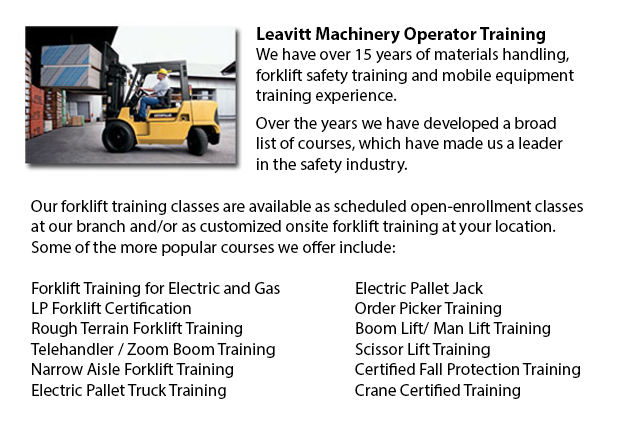
Forklift Certification Schools Saskatoon - Within North America, forklift certification is mandatory, making forklift training programs necessary for both the business and their workers working as forklift operators. Forklift training focuses on safety and health issues involved in making use of forklifts. Safety issues affect both the forklift driver and employees and other individuals who are in close proximity to the forklift. Companies may be subject to penalties if they are caught with un-certified drivers during a check up. There are a lot of compelling reasons why businesses should abide by forklift standards.
Before the worker or trainee is certified to operate a forklift, nearly all federal, state, and provincial rules would need the worker go through an evaluation of the skills necessary for forklift safety. There are numerous forklift certification schools providing courses for workers and there are likewise schools that offer on-line forklift training. Nevertheless, employers should know that forklift certification training is not "just a test". Correct forklift training should consist of several areas of study, like theory and hands-on practice. Rules do not need employers to have an outside organization to certify drivers of forklifts.
A quality forklift certification school would include a recommended curriculum which includes hands-on training that is performed on-site and classroom training. The training sessions within the classroom incorporate videos, power point presentations, discussions and models. Students usually should write a test to check for subject matter understanding. Certificates of completion are issued upon successful completion of the class.
The use of the equipment evaluation requires the trainee to know the job site dangers, pre-operational machine check, a pass/fail operational test and operational instruction.
Training usually comprises the following subject areas: Understanding regulations and legislations; Controls & Instrumentation; maneuvering and Steering; Engine Operation and Maintenance; Fork and Attachment Restrictions, Visibility; Rated Capacities, Stability, Maintenance & Inspection; Load Manipulation; Refueling; Dangerous Locations & Rough Terrain Operations and Pedestrians. Furthermore, there are training courses available for employees who are transitioning to new job positions.
-
Scissor Lift Safety Training Saskatoon
Scissor Lift Safety Training Saskatoon - A scissor lift is a type of platform lift that moves vertically. The lift table is moved in a vertical motion because of criss-cross folding supports that are linked in what is called a pantograph. The platfor... More -
Crane License Saskatoon
Crane License Saskatoon - The operator of a crane has to have been certified with a crane operator license or certification. In order to practice as a crane operator, the credentials are considered mandatory. Licensing consists of training and final... More -
Order Picker Training Saskatoon
Order Picker Training Saskatoon - Order picker's allows warehouse staff to lift pallets making use of forks. Likewise known as a stock picker, this particular electrically-powered machinery is like a forklift except that an order picker is also made... More -
Scissor Lift Training Saskatoon
Scissor Lift Training Saskatoon - While operating a scissor lift, they have to be used competently so as to protect the wellbeing of the other employees inside the workplace and to protect the safety of the equipment. Skilled operators are trained to... More -
Telehandler Training Courses Saskatoon
Telehandler Training Courses Saskatoon - Employers are responsible for making certain that their operating personnel and supervisors are trained to work proficiently utilizing telehandler equipment. The skill level of employees need to be assessed. I... More -
Aerial Boom Lift Training Saskatoon
Aerial Boom Lift Training Saskatoon - For individuals who operate or supervise the use of aerial lift platforms, proper aerial boom lift Training is required. The aerial lift platform is for lifting people, tools and materials to elevated work locati... More -
Narrow Aisle Forklift / Order Picker Training / Electric Pallet Jack / Electric Pallet Truck Training in Saskatoon
A pallet jack is an appliance built especially for transporting pallets of differing weights and dimensions. They may be used in conjunction with cranes, forklifts and other heavy duty machinery as an attachment piece or to be used on their own. Pall... More -
Boom Lift Operator Training Saskatoon
Boom Lift Operator Training Saskatoon - A cherry picker refers to a type of aerial work platform. Cherry pickers include a bucket or platform at the hydraulic lifting system's end. The machine is also known as a man lift, boom lift, basket crane or h... More

Forklift Training Saskatoon
TOLL FREE: 1-888-254-6157
Saskatoon, Saskatchewan
forklifttrainingsaskatoon.com
Email Us
About Us



